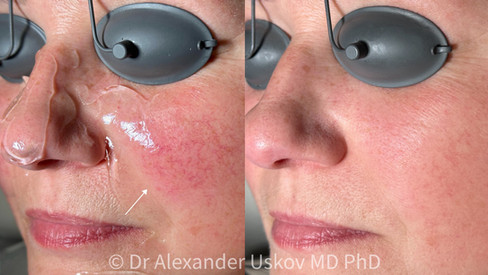Laser treatment for couperose on the cheeks
- gertnulk
- Aug 17, 2025
- 3 min read
Updated: Aug 20, 2025

Couperose on the cheeks is one of the most common aesthetic vascular issues, appearing as persistent redness, a “vascular mesh,” or individual dilated capillaries (telangiectasias).
For many patients, couperose is more than just a cosmetic concern—it can cause discomfort, insecurity, avoidance of makeup or photos, and limitations in social activities. Modern laser medicine offers a precise and safe solution that truly works—even for advanced or complicated cases.
At the clinic of international expert Dr. Uskov, a comprehensive, individualized approach is used for treating couperose, based on international protocols and employing a variety of wavelengths commonly used in vascular laser therapy.

What is couperose and why does it appear?
Couperose is a local dilation of superficial capillaries, most often on the cheeks, sides of the nose, and chin. it is usually not a "disease" in the classical sense, but a manifestation of vascular hyperreactivity and thinning of the capillary walls, which can be associated with:
genetic predisposition (thin, fair skin)
sudden temperature changes
chronic skin inflammation
hormonal changes
corticosteroid use
excessive sun exposure, saunas, or alcohol
age-related changes in the vascular wall
Why is it important to treat couperose?
Although couperose is not life-threatening, it significantly affects quality of life:
persistent redness of the cheeks can look like an "inflamed face"
it cannot be fully masked with makeup or washing
it can give the appearance of a "tired" or "unhealthy" face
it can progress, leading to permanent vascular deformities (rosacea)
Clinical studies confirm:
Laser coagulation of vessels is an effective and safe method for eliminating telangiectasias (Goldberg, 2017)
Nd:YAG and PDL lasers are considered the gold standard for treating facial vascular lesions (Tanzi & Alster, 2006)
Course of treatment at Dr Uskov's clinic
Diagnosis and planning
Before starting treatment, an in-person consultation is conducted, during which the doctor:
assesses the severity, depth, diameter, and location of the vessels
performs, if necessary:
digital dermatoscopy
examination with a UV lamp
infrared vascular imaging
analysis of related skin and vascular conditions
This allows precise determination of the optimal wavelength, energy, number of sessions, and the need for additional measures (anti-rosacea protocols or topical therapy).

Which lasers do we use?
At our clinic, we have lasers covering all wavelengths used for treating vascular issues:
IPL (515–590 nm) — selectively coagulates vessels with minimal impact on surrounding skin
Nd:YAG (1064 nm) — targets deeper and larger vessels
KTP (532 nm) — effective for small superficial capillaries
Picosecond and fractional lasers — used in combined protocols, especially when pigmentation or post-inflammatory changes are present
How many sessions are needed?
Noticeable improvement often occurs after the first session, but a course of 2–3 sessions may be required for lasting results. The exact number depends on:
number and diameter of the vessels
depth of the vessels
age and condition of the skin
coexisting conditions (for example rosacea)
lifestyle and risk factors (alcohol, stress, climate)
How safe is it?
Laser therapy for couperose is safe if:
medical-grade certified equipment is used
an individualized protocol is followed
the procedure is performed under a physician trained in laser dermatology
We aim to remove vessels:
without scarring, burns, or hyperpigmentation when recommendations are followed
with minimal recovery time (1–5 days)
allowing a return to normal life almost immediately after the procedure
Individual results
The result of treatment depends not only on the equipment but also on:
the specific characteristics of your vascular network
hormonal balance
overall skin condition
adherence to post-procedure recommendations (avoiding saunas, alcohol, sunbathing, etc.)
For every patient we take before and after photos throughout the treatment for easy visualization of progress
Dr. Uskov’s treatment protocols
The clinic uses personalized, combined treatment plans, which may include:
laser coagulation
soothing and vessel-strengthening mesotherapy
topical anti-couperose products
consultations on skin care and prevention




















